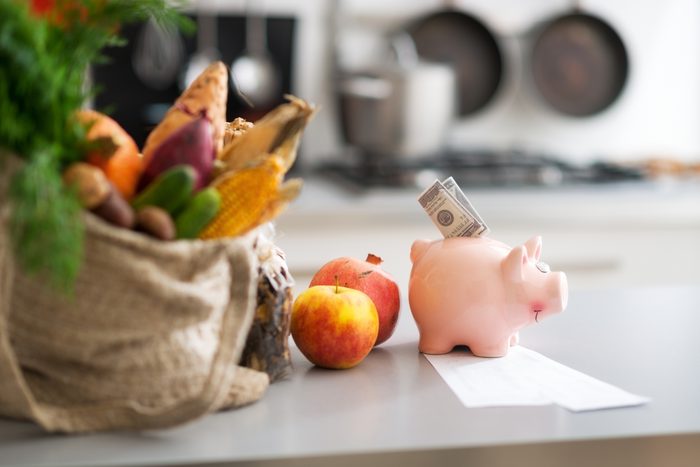
Inflation, aisle 5
Almost everyone who’s set foot in a supermarket lately has suffered anxiety over how to save money in the face of soaring food prices. The cost of at-home food consumption is expected to increase a total of 8.6% by the end of 2023, according to the U.S. Department of Agriculture (USDA). “A lot of it has to do with inflation but also climate conditions and labor shortages,” says Julie Ramhold, a consumer analyst with DealNews.com. “In some cases, it’s also just outright corporate greed.”
While the situation sounds grim for anyone who eats, Ramhold is confident things will change for the better, so you’ll be able to return to your regular grocery shopping habits and rely on your budget grocery list once again.
You might be surprised at how something as simple as poor fridge organization or inadvertently buying grocery store items with the highest markups can cost you if you’re not careful. But knowledge is power, so take note of how these bad kitchen habits are draining your bank account, and learn how to slow the flow. Then find out how to save money on groceries and examine a few other ways to save money you probably haven’t tried yet.
Get Reader’s Digest’s Read Up newsletter for more home, humor, travel, tech and fun facts all week long.

Indulging a food-delivery addiction
We like to support local restaurants too, but ordering in adds up. According to an analysis done by Forbes in 2018, takeout could be costing you five times as much as cooking the same meal at home—and that’s not including the tip. Even delivery kits that supply ingredients for you to assemble into a meal are around three times as expensive as shopping and cooking yourself.
Do this instead: Learn simple ways to meal-prep for the week to save yourself time and money. Not sure where to start? Get some tips from The Healthy Meal Prep Cookbook, which has garnered thousands of positive reviews on Amazon.
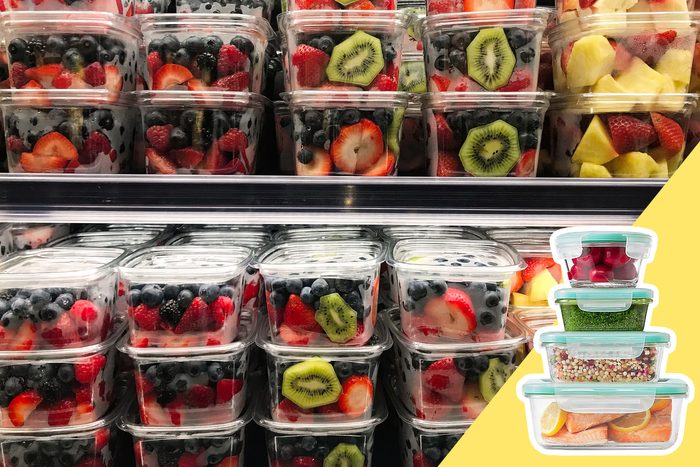
Buying prepared food
Sure, that rotisserie chicken smells good, but it’ll cost you. Any prepared food has labor built into the cost. That includes pre-chopped vegetables and fruits and pre-made smoothies and juices too.
Do this instead: Make it yourself. While you don’t need “to embark on a homesteading routine where you make your own cheeses, yogurt and baked goods if you don’t have the bandwidth for it,” Ramhold says that things like homemade nut butters are generally pretty easy to make and can add up to major savings.
Then meal-prep for the week and store everything in clear containers in the fridge, so they’re ready to go when you need them. “You can control the ingredients this way too, which means you won’t have to worry about weird additives or anything like that,” says Ramhold. Don’t miss these other tricks frugal shoppers use to save big on groceries.
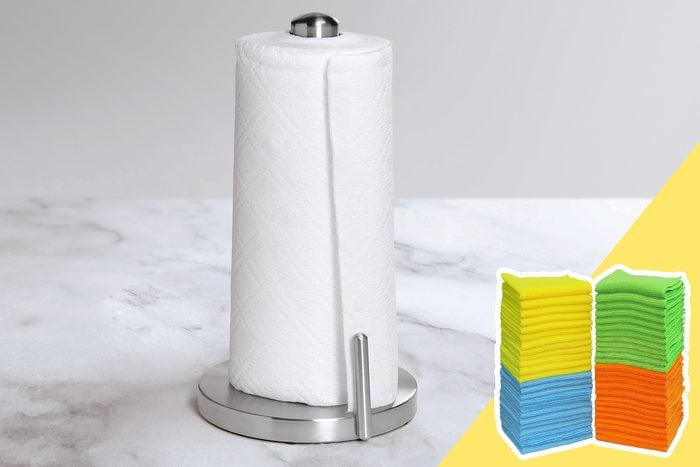
Throwing things out after using them once
Don’t toss plastic forks and cups after one meal, or chuck reusable plastic bags after one sandwich was stored in them either. It’s as bad for your wallet as it is for the environment.
Do this instead: You can rinse and reuse many plastic items. Alma Schneider, founder of the blog and consulting company Take Back the Kitchen, even repurposes the liners from cereal boxes for kitchen storage. As for paper towels that may need to be thrown away after one wipe-down, choose (and reuse) fabric or microfiber cloths instead. It’s better for the environment and your wallet. Plus, check out these things you shouldn’t be cleaning with paper towels anyway.
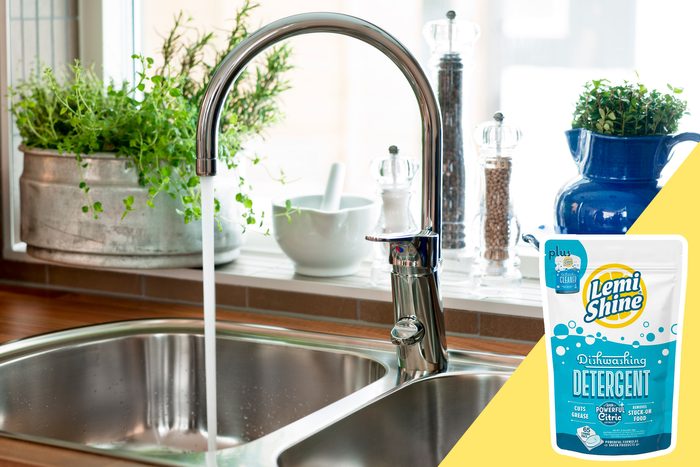
Wasting water
You’re not alone if you think hand-washing your dishes is the more economical choice, but it’s a misconception. Energy Star–rated appliances are so efficient, they can slash your utility bills by more than $100 per year.
Do this instead: Increase your savings by making sure to run a full load—yes, there actually is a right way to load a dishwasher—and shutting off the heat-drying part of the cycle to let dishes air-dry instead. With a good detergent, you can skip the pre-wash too.
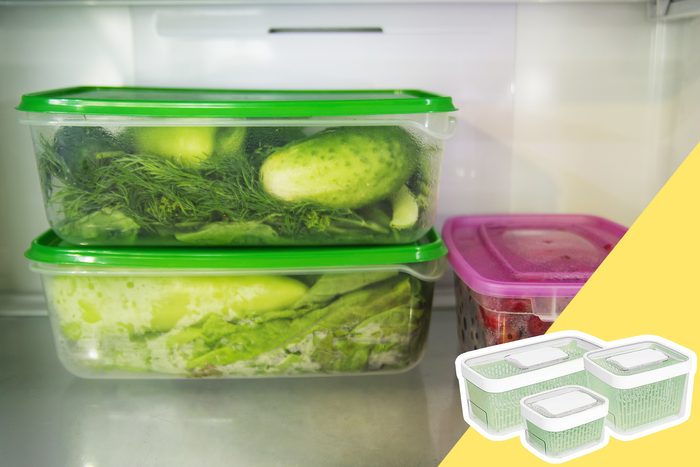
Storing produce the wrong way
“Most people don’t know how to store their food properly, and it goes bad really quickly,” says Schneider. “Moisture is your enemy.”
Do this instead: Wrap fragile veggies like lettuce and herbs in a paper towel inside a resealable bag to extend their freshness. You can also use products designed to make fresh produce last longer in your crisper drawer, like these produce keepers, and dry fresh herbs so they last longer. Of course, every item is different, so check out these tips for storing fruits and vegetables.
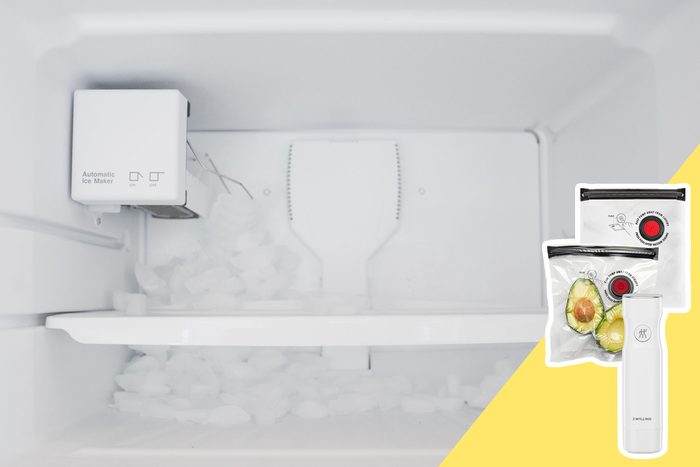
Ignoring your freezer
A well-stocked freezer is a frugal chef’s BFF. Not only is freezing ideal for storing bulk buys, it’s also a great way to preserve produce or other foods that are about to go bad. “Most things can be frozen if you store them properly,” Schneider says.
Do this instead: Bread, leftover pasta sauce, soup and fruit for smoothies are just a few of the foods that freeze well. This vacuum sealer set will get you started. In addition to a large glass storage container, it comes with a vacuum pump and reusable plastic bags, providing vacuum-sealed storage that keeps food fresh longer and protected from freezer burn.

Buying ingredients for one meal at a time
One of the first rules of saving money at the grocery store is to buy in bulk, because less packaging means spending less money. It also saves you time, because you don’t have to go to the grocery store every day.
Do this instead: Non-perishables or things that can be frozen, like meat, are good to stock up on. CSAs can be good options for buying in bulk as well, says Schneider. Just add a freezer label, toss it in there and use as needed. You can save even more by following this advice for bulk buying.
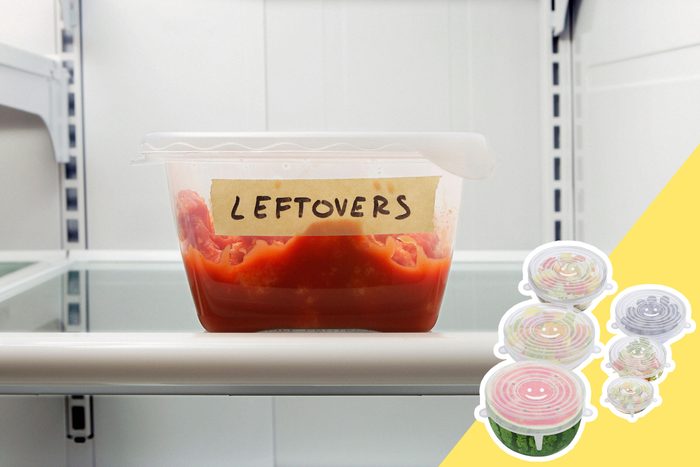
Passing on leftovers
One national survey found that two out of five people hate leftovers. We’re not sure how leftovers got such a bad rap, but it is entirely undeserved. In addition to enjoying last night’s meatloaf and potatoes for lunch the next day, you can use ingredients that weren’t quite used up, like half a jar of salsa or cooked quinoa, to make a delicious new meal (think a salad or grain bowl) instead of throwing them out.
Do this instead: Silicone food covers stretch to fit any container, keeping the contents fresh until you need them. You can run them through the dishwasher and reuse them, unlike plastic wrap. Here are some other kitchen gadgets you’ll wish you had sooner.
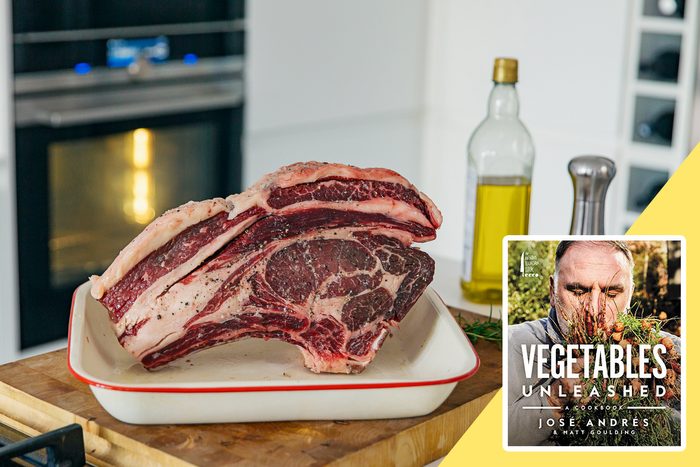
Eating too much meat
Plant-based diets not only tend to be healthier and better for the planet—they’re generally less expensive too. In one analysis, researchers compared the costs of a meat-centric menu based on USDA MyPlate recommendations with a plant-centric one. They found that eating a vegetarian diet could save you more than $745 per year.
Do this instead: You don’t have to give up meat if you love it, but cutting back or using recipes where you can stretch a little will help your bottom line. Veggie recipes from acclaimed chef José Andrés will make you seriously wonder why you never explored this before.

Tossing stuff because of the “best by” date
No one wants to risk food poisoning, but the dates on food labels don’t mean what’s inside is no longer safe to consume. According to the USDA’s Food Safety and Inspection Service, “except for infant formula, dates are not an indicator of the product’s safety.”
Do this instead: If the food looks and smells OK and has been handled and stored properly, it’s generally fine to consume. If you have specific food safety questions, contact the USDA directly, via phone, email or live chat. And if you know that you’re just not going to eat something before its expiration date, freeze it and clearly date it with a storage container that lets you select a date.
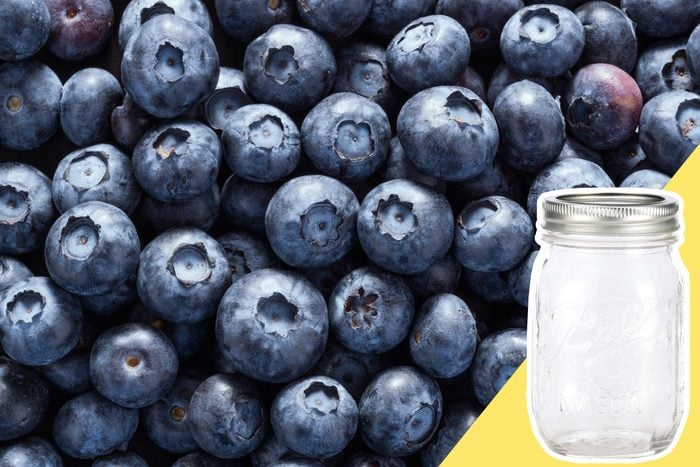
Buying out-of-season produce
Blueberries in January might sound refreshing, but you’ll pay a premium for them. Plus, they never taste quite as good. And when it comes to cutting down on food waste, overripe fruits and vegetables are always one of the first items to get tossed, says Ramhold.
Do this instead: Shopping with the seasons will not only save you cash, your food will also likely taste better, since what you’re eating has been grown fresh naturally, not in a greenhouse somewhere and shipped across the miles. You can also try preserving summer produce yourself by pickling or canning to last through the off-season. And whenever possible, buy produce that’s barely ripe. “We’ve all heard the jokes about buying an avocado and it being mush by the time we get it home, but it’s worth buying slightly underripe produce and then letting it ripen at home,” says Ramhold. “It’ll give you more time to finish the produce with less pressure to rush through it and make yet another loaf of banana bread.”
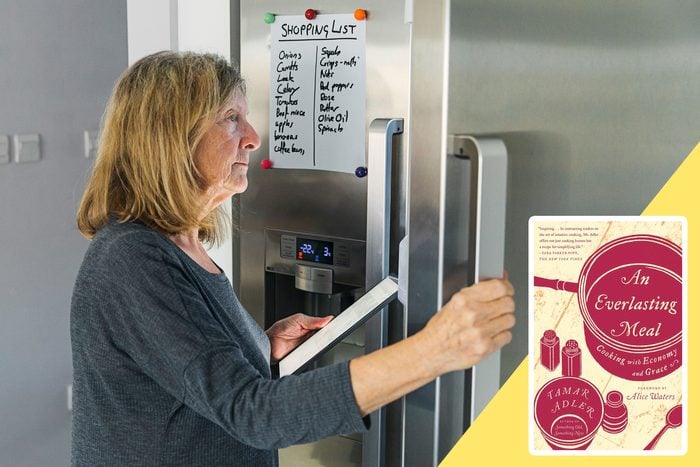
Not planning ahead
“The overarching theme for people who waste money in the kitchen is they don’t plan ahead,” says Schneider. Not having a meal plan means ordering takeout at the last minute or relying on pricey prepared foods.
Do this instead: Having a basic meal plan for the week can help you use up fresh ingredients before they go bad and reuse leftovers from one meal in the next one—there are even recipe books designed for leftovers! It also helps prevent impulse buys at the supermarket.

Going out for coffee
Giving up your Starbucks habit to save money has become a cliché for a reason. Your average coffeehouse chain charges anywhere between $3 to $5 for a small java, and the price goes up the fancier your drink gets.
Do this instead: Brew your own. You can get 50 cups from a 22-ounce can of Melitta, which costs under $19, and you can see how fast the savings adds up. Some brands even offer coffee subscriptions, which often come with perks like free shipping on every order and reward points that can be redeemed for discounts on future orders. Now find out which three things one woman stopped buying to save $5,000.
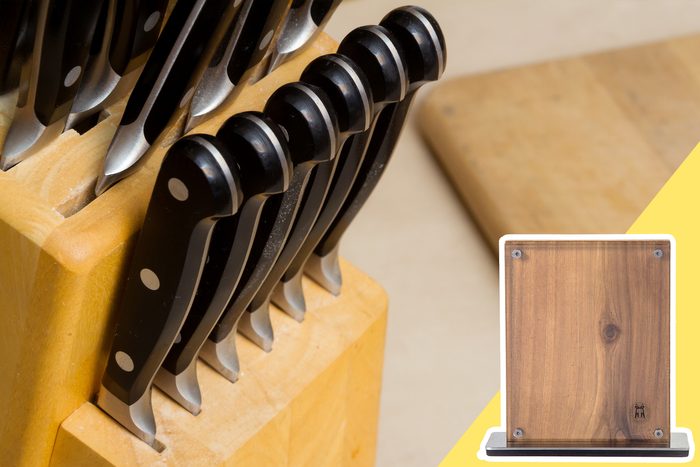
Letting your knives get dull
Knives are a home chef’s most vital tool, but all too often, people don’t maintain them properly and, as a result, buy new ones a lot sooner than necessary. “Think of it as preventative maintenance, like changing the oil in your car,” says Matt Matsushima, director of operations for Shun Cutlery.
Do this instead: Regularly tuning up your knives with a honing steel every five to six times you use them can keep them sharp longer. “The longer between honing, the harder it can be to bring the edge back, and it might need to be sharpened [professionally],” Matsushima says. Hand-washing and -drying (not air-drying) will also prolong an edge, as will proper storage.
Magnetic knife blocks and wall bars can extend the life of a blade, compared with traditional knife blocks. Knife edges dull slowly as they are inserted and removed from a traditional block, due to the friction between the blade and the wood.
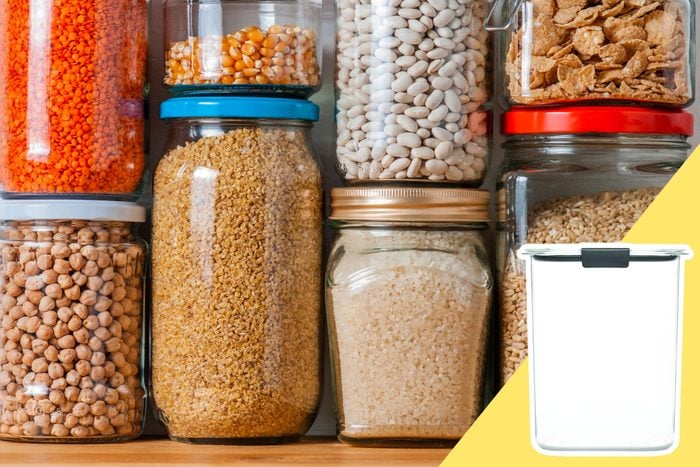
Not storing grains correctly
You may think whole grains are a pantry staple, bread goes in the refrigerator and any food can be stored in the packaging you bought it in. But storing foods properly (or improperly) can make a big difference in how long they last.
Do this instead: Many people don’t realize that you can lengthen the life of whole grains by refrigerating or freezing them, according to Bob’s Red Mill. Flaxseed, for example, contains oils that can go rancid, so it’s best kept refrigerated. Bread, meanwhile, doesn’t do well in the relatively high humidity of a refrigerator, so you should keep it on your kitchen counter. (Here are other foods you shouldn’t put in the fridge.) And unless otherwise specified, it’s also a good idea to store products in airtight containers and not the original packaging to keep them fresher longer. One notable exception: fancy cheese, which should be kept in the paper you bought it in.
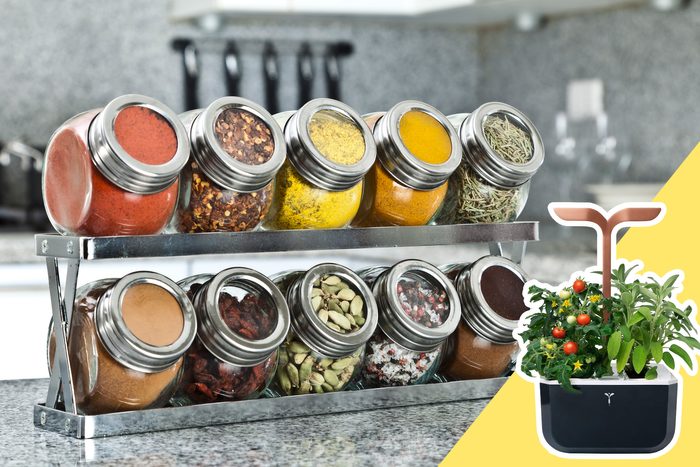
Spending more on herbs and spices
Herbs and spices are a wonderful way to add flavor—and health benefits—to your meals, but some can be pricey. Dried herbs and spices tend to lose potency over time, so buying in bulk only helps if you’re using them in bulk.
Do this instead: For leafy herbs, finely chop them, spoon them into an ice cube tray, then top them with a little olive oil. Once they’re frozen, transfer them to a resealable bag and use as needed for soups and sauces. International grocery stores frequently offer the spices used most often in their cuisine at cheaper prices than big-name supermarkets, so it’s a good idea to shop there. Or you can grow and dry your own herbs for similar savings. Véritable’s indoor herb garden is ideal for people who don’t have a green thumb or those whose homes don’t have great lighting, since it’s outfitted with a special light, as well as an automatic irrigation system.
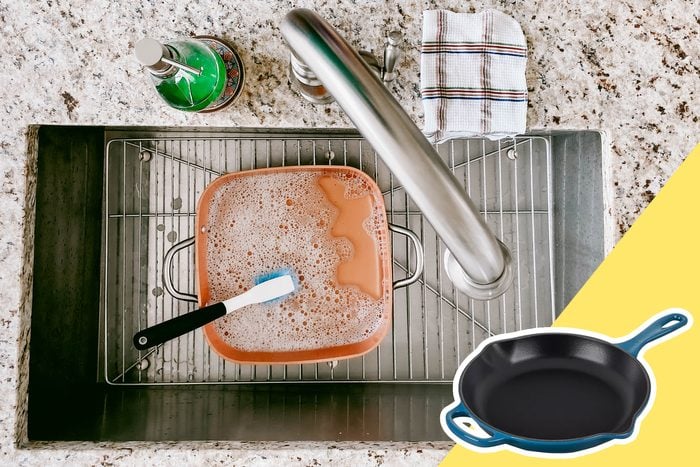
Neglecting your cookware
Nonstick is a great invention, but you can wear it out fast by using the wrong utensils on it (steel can scratch it). And covering it with aerosol sprays will build up over time and be next to impossible to remove.
Do this instead: Cast iron is your most durable option, because it’s virtually indestructible and will last a lifetime—or several—even with hard use. As long as you season it properly, it will be nonstick, and you can bake in it too. Because it’s so durable, it’s easy to find perfectly good cast iron pans at flea markets and thrift stores. Even if they’re in bad shape or rusty, you can scrub them and make them look like new again easily.
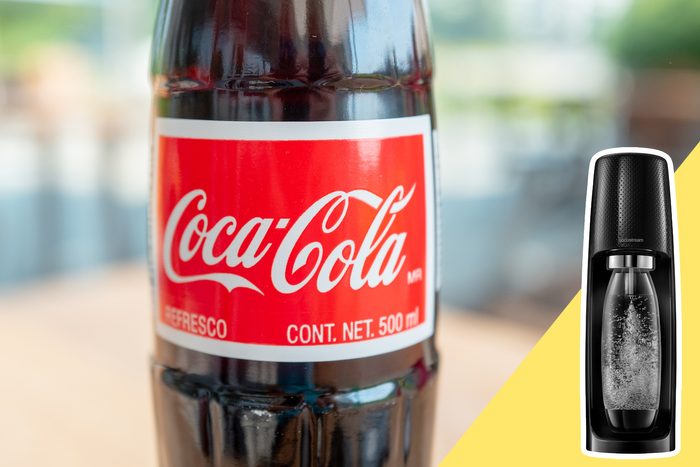
Buying carbonated drinks
A USDA report found that Americans spend more on soft drinks than any other item in their grocery carts. Since then, sales of other beverages, especially seltzer, have been on the rise.
Do this instead: You can make your own carbonated beverages for a fraction of the cost. Home carbonation machines have become reasonably affordable and, after the up-front cost, will produce bubbly water for under $1 per liter. SodaStream has a great reputation for making the fizzy stuff in your own kitchen, in a wide variety of flavors, and its starter kit works with pretty much any bottle.
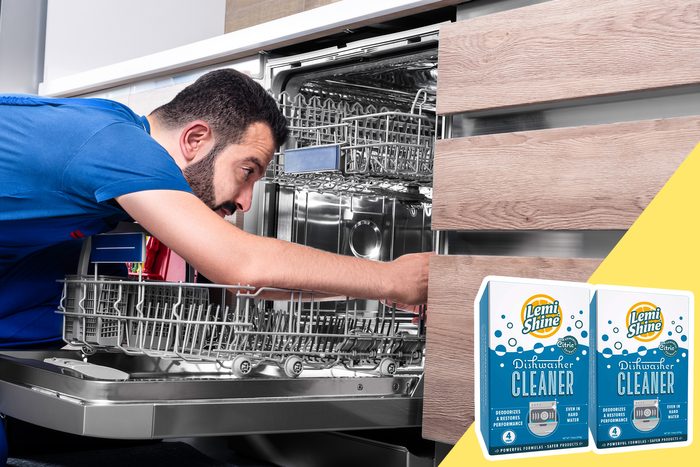
Skipping regular appliance maintenance
People tend to forget that the hardworking machines we rely on in the kitchen need to be maintained, like a car. Treating them right can add years to their life span and save you costly repair bills and, ultimately, a replacement.
Do this instead: Make sure you’re keeping up with the instructions listed in the user’s manual and doing things like cleaning your refrigerator coils and your dishwasher. Lemi Shine Dishwasher Cleaner removes buildup caused by limescale, rust, grease and hard water. Here are more ways you’re shortening the life of your dishwasher.
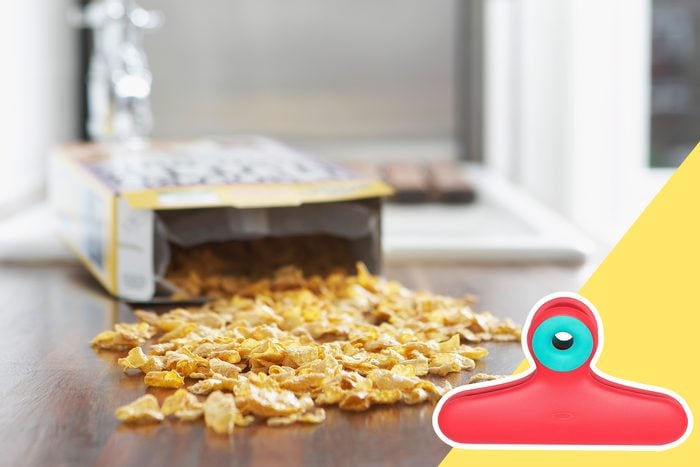
Letting food go stale
Bags of chips, boxes of cereal and other pantry snacks and staples will go stale quickly if you (or another member of the household) leaves them open to the air. All it takes is one time.
Do this instead: If you don’t want to go through the hassle of transferring pantry items to airtight containers, there is still a very simple solution. A simple bag clip can keep the contents of opened bags and boxes fresh—and prevent you from having to toss perfectly good food in the trash.

Ignoring sales
“It’s easy to fall into a routine of buying the same products week after week and having the same meals over and over,” says Ramhold. “While there’s nothing wrong with that, if you aren’t at least glancing over a weekly ad, then you’re missing opportunities to save.”
Do this instead: Make it a habit to peruse the ads so you’ll know when it’s best to stock up and won’t have to count on stumbling across a deal while you’re shopping. It only takes a minute, and you can save some major cash by buying in bulk when an item you eat regularly goes on sale. Ergonomic shopping bag handles can help you get your haul home safely. And eco-friendly shopping bags are a great idea too.
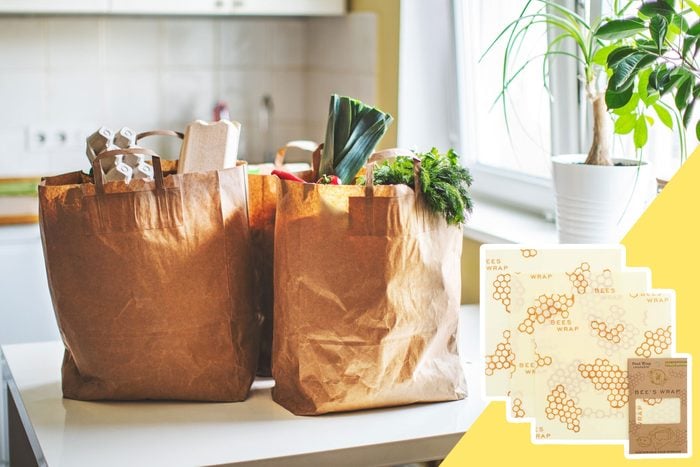
Leaving groceries in their original packaging
A lot of items, especially those you buy in bulk to save cash, can be more than you and your family will eat at one time. And that often means some of it is going to get wasted.
Do this instead: Repackage items immediately at home, says Ramhold. For things like meat and produce purchases, it’s a good idea to prep them and divvy them up into manageable servings, store properly, then refrigerate or freeze as necessary. “By taking care of this immediately when you get home, you can prolong the life of your items,” she says, and reduce the likelihood of waste.
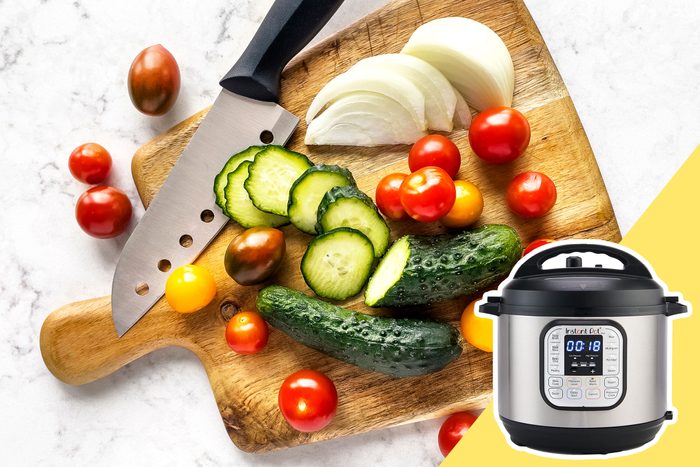
Tossing scraps
The average American household tosses $1,500 worth of food in the garbage every year, according to a site run by the Natural Resources Defense Council. Chicken bones, carrot tops and onion peels may not sound all that appetizing, but they can be made into stock, which has multiple uses in the kitchen. Even cheese rinds can be added to soup for extra flavor. So think before you toss.
Do this instead: Make stock. Old meat bones and other aromatic ingredients like carrots, onions, celery or garlic simmered in water can make what chefs consider liquid gold: stock. Not only is stock a great starter for soups, it can also be used to cook grains, thin sauces or poach things, among many other uses. Making your own is easy and fast when you have a pressure cooker.
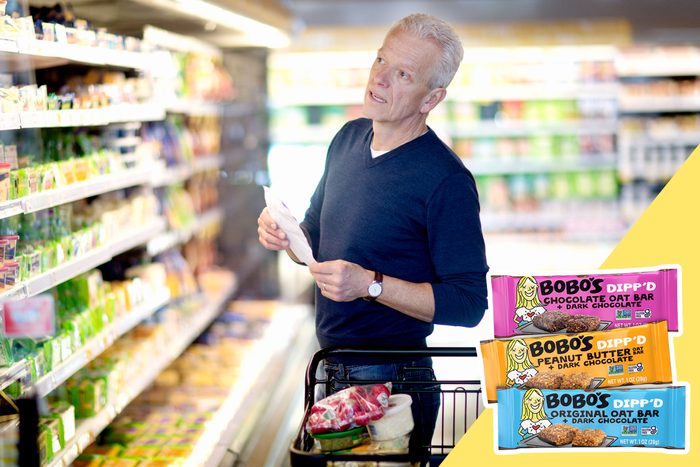
Shopping when you’re hungry or tired
It’s true that everything looks good when you’re hungry, which makes it harder to ignore impulse purchases, says Ramhold. But it’s also harder to be mindful about your shopping when you’re tired; for example, if you’re shopping after a long day of work, then odds are good you’re just going to want to get it over with, which can make you more prone to picking up whatever you want and not checking prices, or even opting for convenience foods, which can also be more expensive.
Do this instead: Eat before you go, even if it’s just a nibble. Keep a snack bar with some protein and fiber in it in your glovebox or handbag for just such a situation. And plan your trips to the supermarket during off hours if possible. Avoiding crowds lets you shop at a leisurely pace, compare prices and not be rushed, which minimizes the likelihood that you’ll forget something and need to make an unplanned trip later.
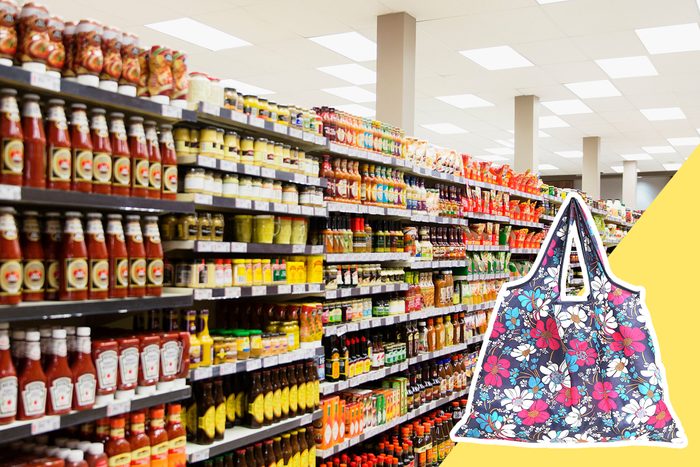
Shopping at the wrong store
Plenty of people pick the closest grocery store to them or stop on their route to work out of convenience, but it’s not necessarily the cheapest. Prices can fluctuate quite a bit depending on where you shop.
Do this instead: Market research on chains with the best prices deemed Market Basket, Aldi, Lidl and WinCo among the top 10 best bargain supermarkets in 2022. You can also find a growing selection of food items at chains like Dollar General and Family Dollar as well. Many of these places are BYOB—bring your own bag—however, so pack some reusable ones and do the earth a favor.
Sources:
- USDA: “Food Price Outlook, 2023”
- Julie Ramhold, consumer analyst with DealNews.com
- Forbes: “Here’s How Much Money You Save by Cooking at Home”
- Alma Schneider, founder of blog and consulting company Take Back the Kitchen
- Matt Matsushima, director of operations for Shun Cutlery
